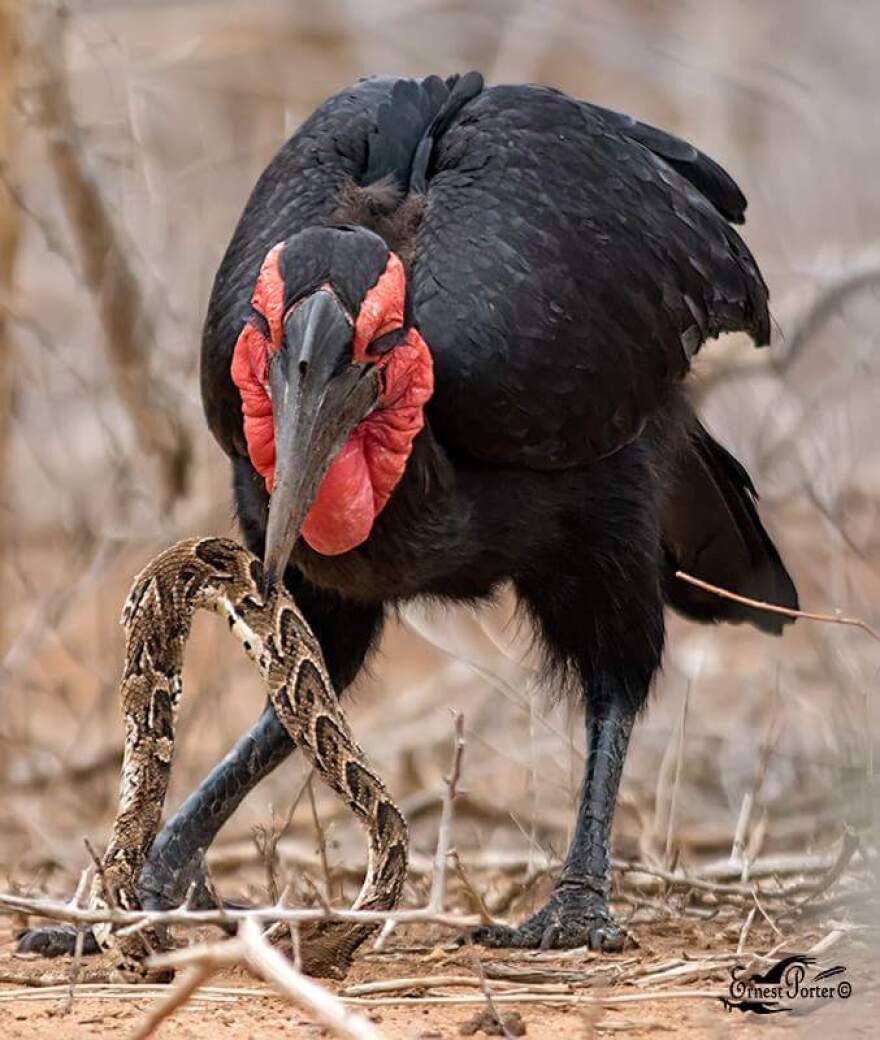That’s the call of the southern ground hornbill.
“So, they're big black birds, big red facial skin, a huge dagger like Bill that they use to destroy venomous snakes, the most insanely long eyelashes, something any supermodel would be proud of," said Lucy Kemp, project manager of the Mabula Ground Hornbill Project, a foundation dedicated to the conservation of hornbills that relies in large part on reports from citizen scientists in and around Kruger.

“So, we've got the posters up at every camp, every gate, and we're busy reprinting now, and we're going to have postcards that guests will be able to take home and hopefully remember to send their details," said Kemp. "And then we've got a WhatsApp plan so it's super easy. People can take a photo and from that we can age the birds so we can get an understanding of how well the birds are breeding. We can see if there's injuries. We can see if any of the ring birds are being reseen. And from some of this data, we were able to find that some of the helper birds in these groups are 35 years old and still living at home.”

In just four years, Kemp and her team were able to secure around 15,000 data points allowing them to conclude that Kruger is essentially ‘full’ of a stable population of hornbills. But the same cannot be said for those living outside the park.
There, they can face illegal harvesting, accidental poisoning, illegal wildlife trafficking that has spiked in the last two years, and a threat that Utahans should be familiar with, since it’s the same one that kills our vultures, lead.
“And it was only through our reintroduction program, because we're tracking our birds so closely that we found this was even an issue. We didn't think this was something that would affect them, and we found, not only does it affect them, but they show clinical signs at much, much lower blood levels than something like a vulture.”
It turns out that amounts of lead as small as a grain of rice can cause severe health impacts for a southern ground hornbill. Thankfully though, Kemp and her team conduct extensive research within hornbill ranges and are able to better tailor their responses based on feedback. In talking to over 800 people from more than 24 villages on the western border of the park alone, they select the best areas for reintroduction, education, or simply communication.
“When we do speak to people who are using lead ammunition, when they know what the health risks are, not just to themselves, but also to things like endangered species, like ground hornbills, they’re shocked, and they willingly make the change," said Kemp. "And so, it's an ignorance problem.”
A problem that Kemp and her team hope to remedy because it turns out it’s a bigger issue than they originally thought.
“We're starting to get poisoned crocodiles in our river systems because they're eating the lead sinkers," she said. "And the more we're looking for lead, the more we're finding.”
Which likely means trouble for not only wildlife, but human health as well. If you’re interested in learning more about Kemp and her research, check out the Mabula Ground Hornbill Project and the newly launched African hornbill conservation alliance that aims to support young researchers and conservationists to build a strong network across Africa.



